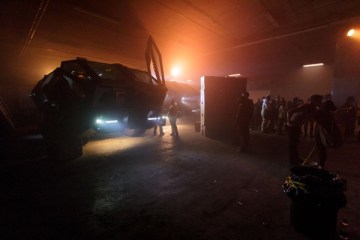Have you heard of Secret Cinema? It’s the question, typically asked by a friend or acquaintance, which usually serves as one’s introduction to the underground film events that have been taking place in secret locations around London since 2007 and are set to launch in New York this fall. Secret Cinema, an off-shoot of the company Future Cinema—which specializes in pop-up film festivals—doesn’t advertise the traditional way, but relies heavily on word of mouth. (Though they do have a vigorous social media campaign.) The films are, after all, meant to be a secret. Billed on their website as “a growing community of all that love cinema and experiencing the unknown,” Secret Cinema offers keen audiences the chance to immerse themselves in a film—although exactly which film it is, is a mystery.
It works like this: moviegoers buy a ticket for £35 ($54) from the purposely vague website and are given a time and a location to meet. The movie isn’t identified but instructions about what to wear and what to bring are included. For my venture on June 29, I was given an employment id, instructed to wear a boiler suit and told to arrive at London’s Euston train station at 6:30 p.m. sharp.
When I arrived I easily spotted a crowd of hundreds in similar costumes. A team of similarly dressed guards led us to a warehouse several blocks away. We were instructed to exchange our cash for corporate chips, corralled through a decontamination chamber where we were misted with water and then ushered through the docking station doors into the warehouse, which had been turned into a futuristic spacecraft.
(MORE: Cinema: A Religion of Film)
The magic to Secret Cinema, I’ve come to learn, is how involved everyone attending gets. While there were a few people who didn’t arrive in costume, almost all of the 800 attendees dressed the part. The guards are actors, hired to stay in character, who lead the group and even act out a few scenes from the movie. Several attendees are given tasks when they arrive, such as putting up maps, aiding in the preparations before take-off or marking off contaminated areas.

Laura Little / Secret Cinema
Most impressive of all was the warehouse’s transformation into a spaceship. Walls were painted white with maps of the ship’s emergency exits everywhere. Hypersleep chambers were laid out in the middle of the room. Loudspeakers droned the message, “Thank you for investing in a brighter future” on repeat. Labs with plants and biology experiments were around every other corner. The 195,000-square-foot space had been entirely changed, and we were given a couple of hours to roam the premises, order cocktails or eat at the space restaurant that was set up.
By the time a warning alarm sounded and the ship employees began ushering everyone into the three screening rooms, many were guessing the movie would be Prometheus. (It was.) While past Secret Cinema films have included The Red Shoes, The Third Man and The Battle of Algiers, the screening of Prometheus marked a departure from cult favorites. The secret screening was launched in tandem with the June 1 U.K. release of the movie and ran for four weeks. (Most people who attend the screenings are good sports and don’t share what the film is. Nearly every person I spoke to had no idea what the film was going to be beforehand even though it had been screened more than 30 times already.) The twist threw a few moviegoers, especially those who’d attended before and were expecting another classic. “I was absolutely clueless,” said Aanchal Khanna, a petite woman in her twenties who’d disregarded the instructions to arrive in costume. Khanna attended the screening with her family and was surprised at the choice of movie.“We didn’t think it was going to be so modern.”
(MORE: Prometheus, an Epic Cinematic Puzzle: TIME Talks to the Screenwriter Behind the Secrets)
Secret Cinema’s creative director and founder, Fabien Riggall, told TIME that the event’s locale — the biggest one to date — was fitting for a movie such as Prometheus. A former short filmmaker himself, Riggall created the events with the idea of offering people “another way of watching films.” He said he felt that there was more to cinema than the modern era of cold, multiplex-screened features. People are missing out on really experiencing film, said Riggall. “So what we try and do is recreate the experience,” he said, by having people engage with the premise of the film and become part of the set. “I think people want to feel more connected to something,” he added. “I think there is a cultural shift happening.”
Though the actual screening of the film isn’t that different from the experience you’d have at a traditional movie theater — the film is still projected onto a big screen and features advertisements at the beginning — people are attracted to the events. With around 25,000 people attending Secret Cinema’s month-long run of Prometheus, the mystery screenings raked in more than $1.1 million and out-earned the film’s appearance at London’s BFI IMAX, typically the highest-earning screen in Britain.
(MORE: Prometheus 101: The Science Behind Ridley Scott’s Vision of Aliens Populating Earth)
While the production cost of the event is far greater than those incurred by traditional cinemas, Secret Cinema has garnered a following of devotees that are there for the event, not necessarily the film. Many of the guests I spoke to were repeat attendees and didn’t much care which movie was screened. Even those who didn’t particularly enjoy Prometheus, like Rachel and Julian Parker Soden, who had been to two secret screenings in the past, still found that they enjoyed themselves. “The experience was quite good, even if the film wasn’t great,” said Julian. “But it was still a good night out.��

